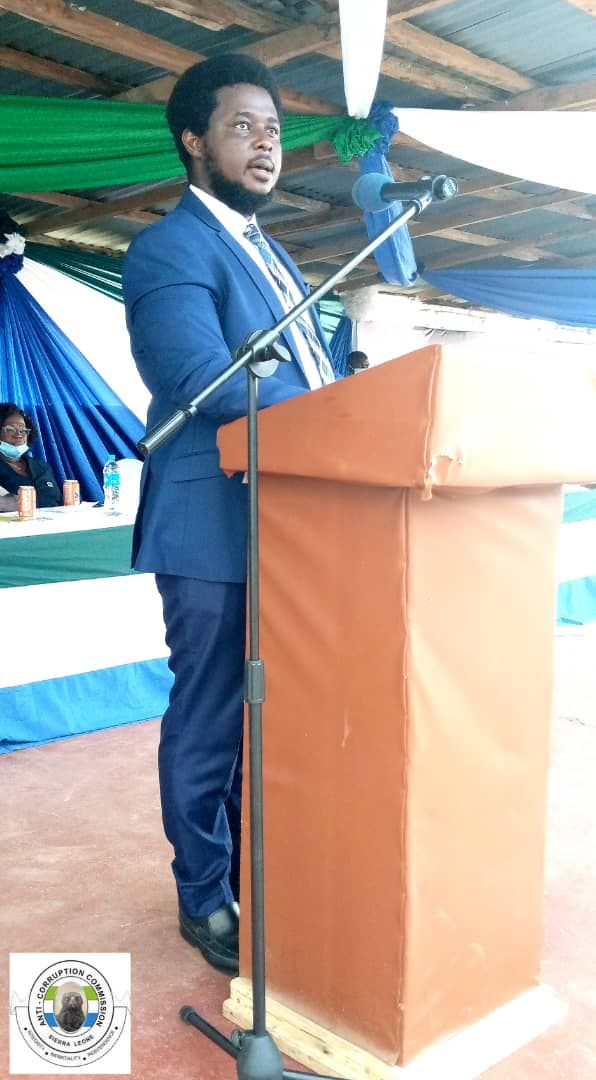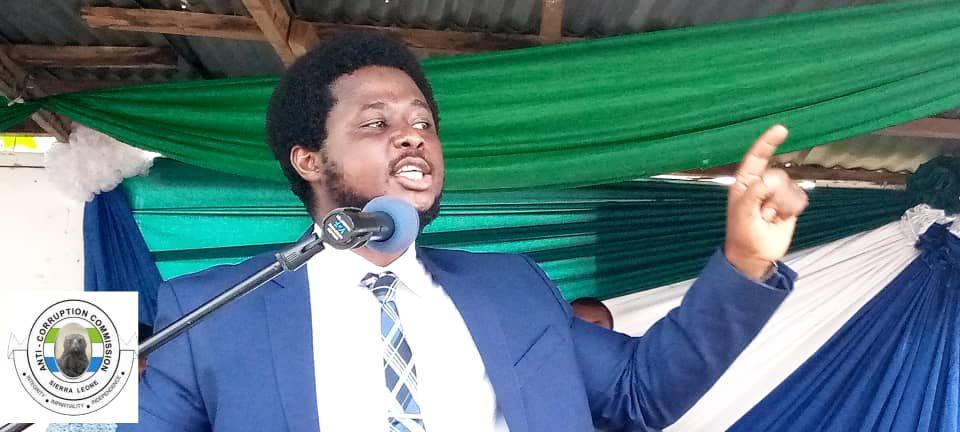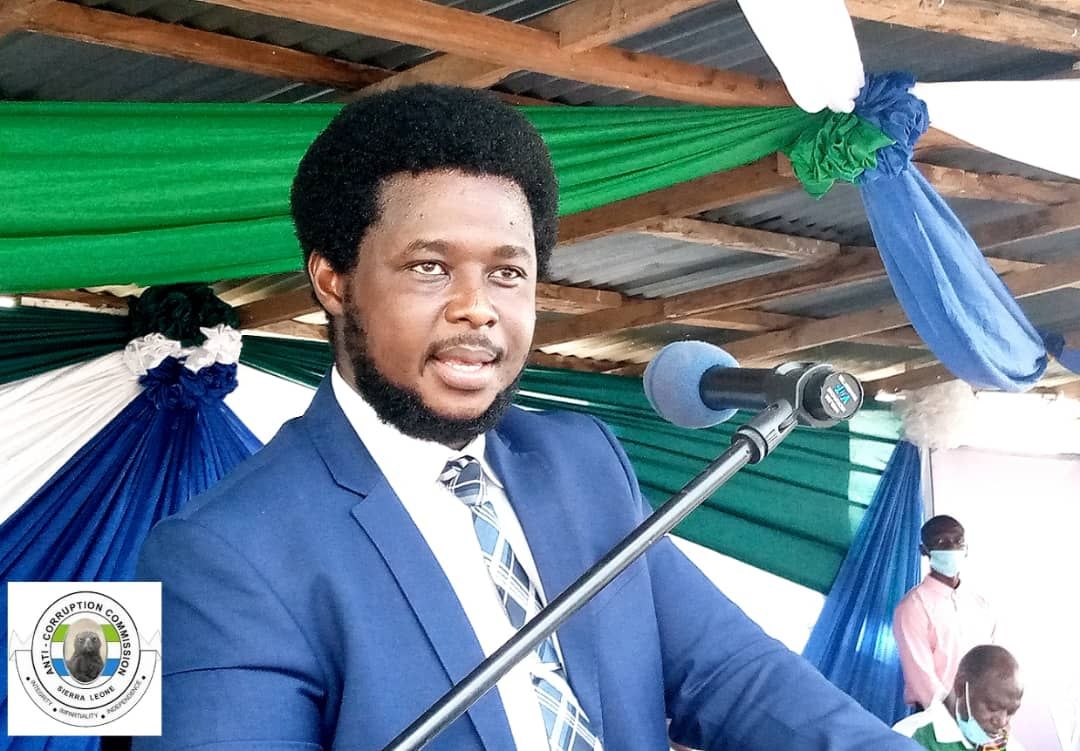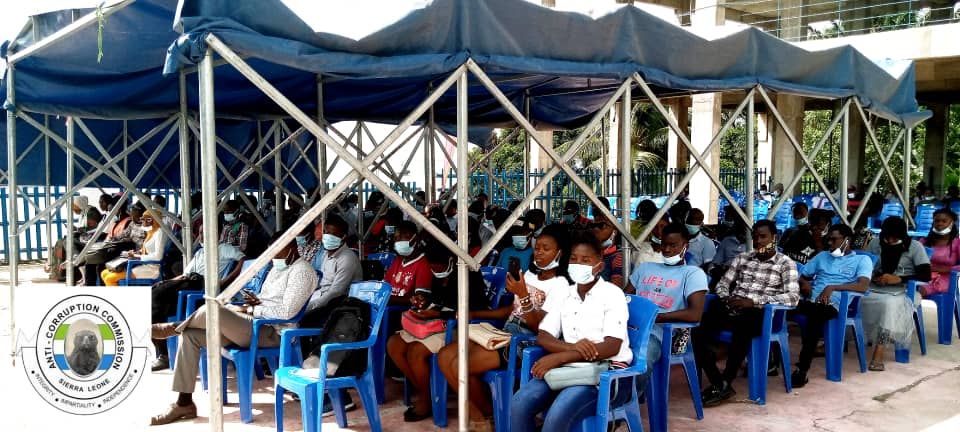Speech Delivered by Francis Ben Kaifala, Commissioner of the Anti-Corruption Commission of Sierra Leone at the UNIMTECH, Freetown, Sierra Leone, On Thursday, 17th June, 2021.
1.All protocols observed, distinguished ladies and gentlemen.
2.Let me start by congratulating the Proprietors, Management and Academic staff and students of this University on the occasion of your first convocation ceremony which was held recently. It is a first for you, but I see it as a massive milestone. All the great universities of the world started in similar fashion. So, I believe this achievement is sign of greater things for this university, the country and the world at large.
3.Mr. Chairman, former British Prime Minister David Cameron, once said: “The evil of corruption reaches into every corner of the world. It lies at the heart of the most urgent problems we face- from economic uncertainty, to endemic poverty…”
4.Advanced nations of the world know that a country’s desired development aspirations cannot be achieved where corruption is systemic and widespread.
5.By definition, corruption is often seen as the abuse of entrusted position or office for private gains. The World Bank defines it as “a form of dishonesty or criminal offence undertaken by a person or organisation entrusted with a position of authority. “
6.Sierra Leone’s Anti-Corruption Act 2008 as amended in 2019 does not provide a definition of the term. But the two pieces of legislation guiding our work, outlines a list of offences and practices which constitute an act of corruption. They include; Bribery, Misappropriation of Public/ Donor Funds/Property, Corrupt Acquisition of Wealth, Unexplained Wealth, Bid Rigging, Impersonation, Failure to declare assets, etc.
7.The consequences of the disease and monster we call corruption are disastrous and life-threatening. I need not remind of the fact that corruption is one of the major causes of the decade-long civil war that led to the loss of thousands of lives and to the near collapse of the country’s infrastructure, according to the Truth and Reconciliation Report. The massive youth unemployment rate we face today are largely as a result of unchecked acts of corruption of the past. The consequences of corruption are very serious.
8.That is why the drive of anti-corruption agencies around the world is to employ strategies that will prevent corruption from taking place.
9.Mr. Chairman, we are all now too familiar with the common adage that says: “Prevention is better than Cure”. Donald McPherson, an American and former NFL Player, would say “True prevention is not waiting for bad things to happen, it is preventing [bad] things from happening in the first place.” This is the model mostly employed by highly transparent nations like Singapore, to combat acts of corruption.
10.According to Vincent Lim of the Corrupt Practices Investigation Bureau in Singapore, the country discovered that ‘Ample Opportunities for Corruption’ was one of the main reasons for the widespread corruption that marred the country before the 1960s. Consequently, the country passed into law a Prevention of Corruption Act and a national strategy, which, according to Vincent Lim, provided for among other things:
11.“Streamlining of cumbersome administrative procedures and slashing red tape to provide an efficient and transparent civil service so that no one needs recourse to corrupting civil servants to get things done; [and] reminding Government contractors at the time when contracts are signed that bribing public officers administering the contract may render their contracts to be terminated. A clause to this effect forms part of the standard contract conditions.”
12.All anti-corruption agencies across the world know the enormous benefits embedded in preventing corruption. As the United Nations Office on Drugs and Crime (UNODC) puts it, “even the most successful enforcement of criminal law happens after the crime has already been committed and the detrimental consequences of corruption have taken place.” So prevention strategies are put in place to build and strengthen the systems and internal control measures of the institutions in a bid to make them resistant to corrupt practices.
13.When it comes to the aspect of preventing corruption, UNODC singles out “strengthening the public intolerance to corruption as well as strengthening the integrity of the public administration” as very key. It adds that, “identifying and addressing corruption risks through corruption risk assessment, is becoming more and more popular.”
14.The importance of preventing corruption is recognized in Chapter II of the United Nations Convention against Corruption (UNCAC). It underlines the need to address the risks of corruption by:
•Adopting the effective and coordinated policies against corruption;
•Strengthening the integrity of the public sector;
•Fair and transparent system of public procurement; and
•Strengthened transparency and public reporting.
15.Adopting effective and coordinated policies against corruption is achieved by putting together a “coherent anti-corruption policy which identifies the causes of corruption and commits to practical, coordinated and effective measures to address these causes.”
16.Strengthening the integrity of the public sector works by making sure that public institutions are “transparent, accountable to the citizens, free of conflicts of interest and operates on the basis of clear rules.”
17.Fair and transparent system of public procurement recognizes the fact that a large percentage of countries’ annual spending goes towards procurement. As such, it is important to establish a “procurement system, built on the principles of objectivity, transparency and competition” in a bid to save public funds as well as ensuring that the policy and developmental objectives of the government are met.
18.Strengthened transparency and public reporting promotes issues like freedom to access information, which in turn promotes an informed society that can feel empowered to contribute to the fight against corruption.
But how can Management and Technology play a part in preventing corruption?
MODERN DAY MANAGEMENT SYSTEMS MUST BE ABLE TO CONFRONT CORRUPTION
19.Management is often described as a body of people charged with the responsibility of planning, decision-making, organizing, leading and controlling the human, financial, moveable and non-moveable resources of an organisation to achieve the organisation’s goals and objectives.
20.According to the OECD, the top Management of every institution should be able to develop “business ethics embodied in company mission, vision or value statements. In many cases, such statements are elaborated in company codes of conduct- or more detailed statements of policy.” These policies are often developed for employees, shareholders and members of the public to know the institution’s zero-tolerance position on corruption.
HOW TECHNOLOGY CAN HELP IN THE FIGHT AGAIINST CORRUPTION?
21.In the area of Technology, it has now become apparent that corrupt practices have become so sophisticated and complex to the extent that the most advanced technology is sometimes used to beat anti-corruption agencies from detecting them. The thing is; monetary and financial transactions, procurement processes, among others, can now be done electronically with any hand-held device at any time and any place on earth, and even beyond.
22.The Asia-Pacific Economic Cooperation (APEC) Anti-Corruption and Transparency Working Group holds that “the fast-adapting nature of today’s technology also enables new ways of corruption to evolve faster than law enforcement agencies can identify.”
23.But in the midst of all this, we have also seen how technological advancements have helped the world in building incorruptible systems that eliminate face-to-face or manual transactions, which were a recipe for corruption.
24. APEC also believes that “Advances in technology are helping the fight against corruption, by prompting governments and the private sector to improve transparency and citizens to demand more accountability. Potential whistle-blowers, for example, have more channels of reporting, including through encrypted messages. Information about assets, travel and procurement is now easier to access.”
25.When we say whistle-blower, we mean the one defined by The Economic Times as “a person, who could be an employee of a company, or a government agency, disclosing information to the public or some higher authority about any wrongdoing, which could be in the form of fraud, corruption, etc.” So, whistle-blowing is not about sensationalism or mere reportage of audit findings or making sensational authorized expenses of top governmental officials.
26.You do not need to work for the ACC for you to know that the Commission had, on many occasions, swiftly acted on genuine reports of corruption. Some of you could recall the matter involving those bloggers at the Sierra Leone Liberian Border, who raised the alarm that the sum of Five Hundred Dollars was extorted from them by Immigration Officials. In less than twenty-four hours, the Commission arrested the Immigration officials involved and swift action was taken against them, while the money was later returned to the bloggers.
27.Back to the subject matter, Sofia Wickberg of Transparency International, holds that New Technologies “help to monitor the efficiency and integrity of social services and of a country’s political life, and make financial information more transparent. Information and communications technology can also support campaign efforts and help mobilize against corruption.”
28.The World Economic Forum identifies four technologies that can help in the fight against corruption; which are Big Data, Data Mining, Mobile Applications and Forensic Tools.
29.Big Data means using technology to build and strengthen transparency and accountability systems and processes of institutions by developing software to “detect and deter fraud and collusion”.
30.Data Mining helps in auditing purposes to “monitor when governments are issuing bids and to identify red flags, patterns of collusion and false information…[and] to identify corrupt intent in payments or transactions.”
31.Mobile Applications. The World Bank, for example, is using mobile applications for citizens to report suspected acts of corruption associated with projects implemented by the Bank. The ACC also used this effectively during the roll out of our Pay No Bribe Campaign.
32.Forensic Tools, which are mostly used by auditors, are employed to combat corruption risk, as they can handle real-time analyses of transactions.
33.These technologies are often employed by transparent and advanced countries across the world for citizens to access government services, thereby enabling them transact in the comfort of their homes.
34.Corruption is a very complex phenomenon; therefore, eradicating it needs a multi-faceted approach. Even where a national anti-corruption strategy has spelt out the approaches to fight against scourge, an anti-graft agency must have the latitude to use various means to achieve results.
35.This is possibly the reasoning when the drafters of the Anti-Corruption Act 2008, as amended in 2019, couched Section 7(1)(a) of the Act, mandating the ACC “to take all steps as may be necessary for the prevention, eradication or suppression of corruption and corrupt practices”.
VARIOUS PREVENTION APPROACHES EMPLOYED BY THE ACC TO COMBAT CORRUPTION
36.Together with Section 7(2)(p) of the Act, which provides for coalition building and partnership in the fight against corruption, this is where institutions and bodies like yours come in to join in the public education and prevention strategies of the fight.
37.In the past few years, the ACC under my leadership, has opened the doors of the Commission more widely to welcome worthy partners from other government agencies, non-governmental organisations, community-based organisations, students’ groups and many more.
38.In fact, when you talk about students’ groups, through the Public Education and Outreach Department, we continue to establish Integrity Clubs and Accountability Now Clubs in schools and tertiary institutions across the country.
39.The essence of these clubs is to instill in young people the values of accountability, transparency and integrity, so they would become loyal, nationalistic and productive citizens. In the words of Angel Gurria, Secretary General of the OECD, “Integrity, transparency and the fight against corruption have to be part of the culture. They have to be taught as fundamental values.”
40.With these clubs, pupils and students also learn about issues of corruption and how the scourge poses a real threat to their aspirations. The clubs also serve as a training ground to empower them with the requisite knowledge and information to help in the fight against corruption.
41.As I speak, the Commission has been able to establish Sixty-One Integrity Clubs in schools and Eleven Accountability Now Clubs in tertiary and vocational institutions across the country. The Commission is poised to establish more such clubs across the country much as a result of request from pupils, students and authorities of the institutions.
42.In that light, I would like to encourage the students, Management and Academic staff of this institution to work with the ACC to establish an Accountability Now Club in this institution for the sole purpose of the objectives I have just highlighted.
43.The other preventive approach undertaken by the Commission is through the conducts of customized meetings with ministries, departments and agencies of Government. This involves the Commission taking up corruption complaints, often received through the Commission’s Report Centre and the media, with the relevant public office. During the said meetings, general corruption issues bedeviling the sector are brought to the attention of the leadership of the institution responsible, for them to be addressed.
44.But the most comprehensive prevention strategy is embedded in the Commission’s conduct of systems and processes reviews in public offices. This is in accordance with Section 7 (2)(f) “to examine the practices of public bodies in order to facilitate the discovery of corrupt practices or acts of corruption and to secure revision of those practices and procedures which in the opinion of the Commission, may lead to or be conducive to corruption or corrupt practices.”
45.The systems and processes review exercises conducted by the Commission’s Prevention Department has produced remarkable results. In the offices that we have intervened, we have seen unprecedented high revenue generations, value for money, efficient and effective services and less corruption practices. Where government revenues were often paid cash to cashiers of the institutions, we have changed that to payment directly to banks.
46.Our interventions normally also ensure the development of policies on the use and management of public revenue, fuel, vehicles and other government property. We have also developed codes of conduct for staff where there were none or obsolete ones. Codes of conduct specify the manner of behavior expected of public servants while in office.
47.Through the National Anti-Corruption Secretariat, we are also rolling out the current National Anti-Corruption Strategy which runs from 2018 to 2023. One critical component of the current strategy is to establish Integrity Management Committees (IMCs) in all public offices. The Committees operate to identify and address corruption issues within their institutions. The work of these Committees has helped in the massive reduction of incidences of corruption in the offices where they are fully functional.
48.But, probably, the biggest prevention approach to corruption is making sure we end impunity by way of enforcing the anti-corruption laws through investigation and prosecution of individuals accused of acts of corruption. Nobel Prize Laureate Rigoberta Menchu would say “if impunity is not demolished, all efforts to bring an end to corruption are in vain.” We normally say in our local parlance: “Kill dog before dog make dog know say die dae”.
49.At the ACC, that is why we continue to fight corruption as if we are losing. The only things guiding our work is the Anti-Corruption Act 2008 as amended in 2019, the National Anti-Corruption Strategy- which is a product of how you the people of Sierra Leone want to see the fight against corruption being done, and international instruments like the UNCAC. Therefore, we will continue to fight corruption that happened in the past, present or future. And we give equal treatment to all cases of corruption, whether they happened yesterday, today or tomorrow.
GAINS MADE IN THE FIGHT AGAINST CORRUPTION
50.Consequently, I am very proud to state that the Commission, under my leadership, has investigated and charged to court more officials of the current administration than those of the past administration. This is backed by evidence, which is there for you all to see and access. Feel free to contact the ACC at any time for us to provide statistics on what I just told you.
51.It is out of these interventions that the Commission has been able to recover over Thirty Billion Leones from corrupt individuals in both the past and current administrations in the under three years of my leadership.
52.So, when you hear about our impressive international and local rankings, it is due to all the fantastic work the President, his Government and the ACC continue to do to control corruption in the country. The agencies compiling these surveys and ranking are very independent of our control or that of the Government.
53.But the good thing about them is that they conduct their research very well. It is based on their research and evaluation of our work that, the Millennium Challenge Corporation of the United States, for example, rated Sierra Leone in the area of ‘Control of Corruption 71 percent in 2018, 79 percent in 2019 and 81 percent in their last rating. I need not inform you that our ranking in this category was 49 percent in 2017.
54.The highly respected Transparency International based in Germany is also aware about the robustness we have put into the fight against corruption, which is why the country has moved 12 places up in their Corruption Perception Index from 130 in 2017 to 117 in 2020.
55.So, if you hear about the United States Government declaring me as an Anti-Corruption Champion or the African Union Advisory Board on Corruption electing me to serve in the continent’s highest anti-corruption body, it is due to the work we have done as a Commission.
56.If you hear about the President of our beloved country addressing the United Nations on issues of corruption, it is because the other countries of the world have recognised the gains we have made as a nation in combating corruption.
CONCLUSION
57.In conclusion, let me remind you that, in the , the Commission has been able to employ multi-faceted strategies in the fight against corruption, including raising awareness, strengthening systems of public sector institutions and investigation and prosecution of corrupt public officials.
58.But we have also come to learn that Management and Technology in institutions can also play a critical role in combating corruption in the modern day. It is the combination of these strategies that has helped the Commission achieve all the outstanding results that have made Sierra Leone an enviable model among other countries as far as the fight against corruption is concerned.
59.But as I keep on saying, we will continue to fight corruption as if we are losing. But we cannot always fight all by ourselves. We need the people of this country to fight along with us. Be on the side of the Commission no matter the kind of fraternal relationship existing between you and the person that is under the ACC net.
60.You should not even act indifferent. For as Delia Ferrira, Chair of Transparency International, puts it; “People’s indifference is the best breeding ground for corruption to grow.” So, I encourage you to instead act to make a difference. Be that faithful voice even among the cynical voices.
61.Like Padme Amidala of Star Wars puts it “there are still those of us who work to overcome corruption and believe it to be possible.” I encourage you to be among those holding that belief.
I THANK YOU!
Francis Ben Kaifala Esq.
Commissioner, ACC








